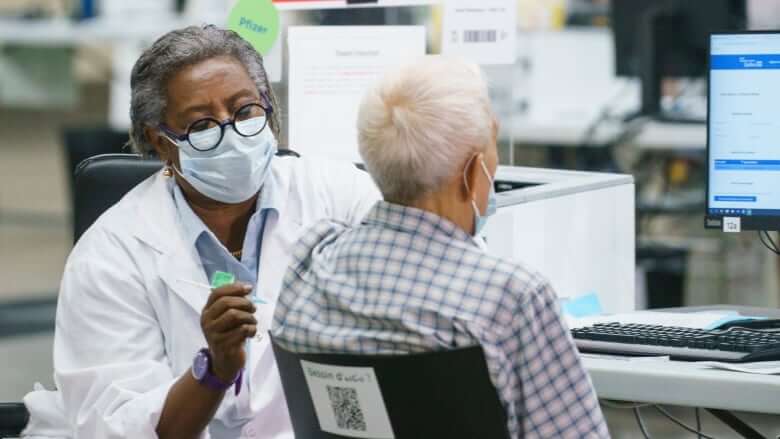Quebec’s vaccination passport plan threatens to infringe on ‘freedom of movement,’ expert says

The Quebec government may introduce COVID-19 vaccination passports in September that would give only people who are fully vaccinated access to non-essential services like gyms and cinemas if cases skyrocket once again.
Vaccine passports ignite debate over privacy vs. public health
Lockdown measures throughout the pandemic closed entertainment venues, bars and restaurants in an effort to curb the spread of the coronavirus. Pumping iron alongside strangers and dining with friends became a distant memory.
But if the virus starts spreading once again, vaccination passports would allow such businesses to stay open, the province announced on Thursday.
The policy is being discussed on a provincial, federal and international scale, with some countries already implementing similar measures. Quebec officials have been hinting at the passport plan for months.
Since the spring, the province has been issuing QR codes, or quick response codes, to vaccinated people. These codes can be scanned to pull up information about a person’s vaccination status, although so far, the province has not provided anyone with the information to interpret the codes.
In Quebec, about 82 per cent of the eligible population in the province (age 12 and up) have received one dose of vaccine, and 40 per cent have received two doses.
However, Quebecers in the 18 to 29 age range are lagging behind.
While the intention may be to encourage more people to get vaccinated before a fourth wave hits, Kerry Bowman, a bioethicist at the University of Toronto, says vaccine passports raise ethical concerns as they “absolutely come with an element of surveillance to them.”
“Freedom of movement is really a fundamental democratic right,” he said.
People’s movement would be tracked, and that raises concerns about who has access to that data and how it is stored, said Bowman.
He said it’s also unclear how long these fundamental rights would be suspended. Some freedoms may not be retrievable once the pandemic ends, he warned.
Bowman said it’s impossible to know what the epidemiological situation will be in September, and how many people will be vaccinated by then.
“I see it as an erosion of a certain amount of freedom and liberty and is it justified? When I look at it from a risk-benefit analysis, we just don’t have enough information at this point to be doing this,” said Bowman.
Back in May, Canadian privacy commissioners issued a warning about vaccine passports, saying measures must be taken to ensure personal information is protected.
“While this may offer substantial public benefit, it is an encroachment on civil liberties that should be taken only after careful consideration,” federal, provincial and territorial privacy commissioners and the ombudsperson’s offices in Manitoba and New Brunswick said in a joint statement.
The statement went on to say, “Vaccine passports must be developed and implemented in compliance with applicable privacy laws.”
Concerns over discrimination debated
But what about discrimination against those who refuse to get vaccinated or those who simply can’t due to health reasons?
Bowman said people who have a legitimate reason not to get vaccinated may find themselves answering uncomfortable questions at the entrance to a restaurant or gym.
Vardit Ravitsky, a bioethicist at the Université de Montréal, says the approach introducing vaccine passports only in the event of an outbreak and to be used only for access to services deemed non-essential, is nuanced and non-discriminatory.
“When it’s well targeted like that, so temporary and specific to a place or an activity, I don’t think you can talk about discrimination,” she said.
“It is a public health measure applied on a proportional basis, to prevent further human rights violations.”

Ravitsky said it is an “extremely well justified” public health measure as it is focused on such a narrow field of non-essential services while vaccination proof will not be needed for essential services like grocery shopping.
Vaccination passports serve as incentive
The provincial government’s plan gives people plenty of time to get full vaccinated before September, Ravitsky said.
Dr. Cécile Tremblay, a microbiologist and infectious diseases specialist at a major health-care network in Montreal, told Radio-Canada she believes using a vaccine passport can serve as an incentive for people who don’t see vaccination as a priority.
As research also shows, Tremblay noted, one dose of vaccine is ineffective at preventing the spread of the more highly contagious delta variant.
“We don’t want people sick or to die, but we also don’t want our health-care system to be overwhelmed, like it was in past waves,” she said.








Redes Sociais - Comentários